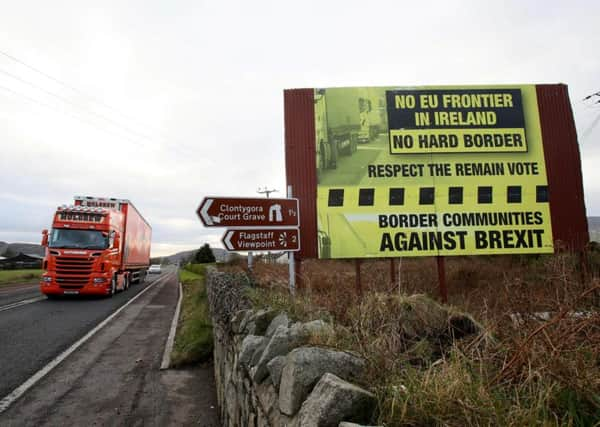Ruth Davidson: Brexit deal must not threaten border-free UK for Scotland


In my former life as a journalist, I well remember the ritual of EU negotiations. Deadlines would be set. Deadlines would be missed. And just when watchers were predicting collapse, a deal would emerge in the Brussels dawn and everyone would stagger up to waiting cameras to declare they had scored a major victory. The whole tortuous process would inevitably start again, on a different issue in a few months’ time.
Judging by events this week, it’s clear that as we prepare for the biggest negotiation of all – to leave the EU – we should buckle up for more of the same.
Advertisement
Hide AdAdvertisement
Hide AdYet experience tells me to remain optimistic that – despite the bumps in the road – the UK and EU teams will be able to reach an agreement in the coming days over the terms of our exit, in order to move onto the key issue of our future trading relationship.


For me, over the last 48 hours, there have been two key issues that I want to stress.
The first is that, as we prepare to leave the European Union, Scotland’s best interests are served by being part of a border-free United Kingdom. We trade four times more with the rest of the UK than we do with the entire European Union.
My view is therefore that, whatever happens with Brexit, we should do nothing that damages the integrity of the one Union that really does keep Scotland in business.
A markedly separate deal for Northern Ireland – perhaps with membership of the single market – could have unravelled the entire United Kingdom; indeed, the alacrity with which Nicola Sturgeon spotted a political opportunity on Tuesday only served to demonstrate as much.


That is why I made clear to the Prime Minister yesterday that neither I nor the 13 Scottish Conservative MPs at Westminster could support such an arrangement. It was why I was pleased to see David Davis and fellow UK Ministers reiterate this was not what was going to happen.
Naturally, the SNP will want to argue that, in doing so, I am blocking some sort of unspecified ‘special deal’ for Scotland. That is because, as far as they are concerned, a border at Berwick is a price worth paying for being different.
I disagree. Standing up for Scotland takes many forms. Protecting our border-free access with our biggest market – the rest of the UK – is a fairly significant one. We should do nothing to imperil that.
Advertisement
Hide AdAdvertisement
Hide AdBut there is, of course, a much wider issue – and that is the shape of our future relationship with the European Union. And, as someone who supported Remain in the referendum, the second issue for me this week is about maximising all possible free trade with the rest of the European Union.
The case of Northern Ireland highlights the need to maintain that free trade. For those communities on either side of the border, it isn’t just an abstract ideal, it is about the living standards of all and economic survival of many.
But just as it is vital for them, so – I would argue – it is important for all of us too. That is why I have also said that, if we are to have regulatory alignment in certain areas in order to maintain a frictionless border on the island of Ireland, then that should apply for all the rest of the UK too.
Not because we are being forced into it but again, because it is in our interests to do so.
For all the drama of the last few days, this vision of a Britain broadly aligned with the European Union is something the Prime Minister herself set out in her Florence speech earlier this autumn.
Speaking directly to fellow EU nations, she declared: “We share the same set of fundamental beliefs: a belief in free trade, rigorous and fair competition, strong consumer rights, and that trying to beat other countries’ industries by unfairly subsiding one’s own is a serious mistake.”
We shared a “commitment to high regulatory standards”, she added. People, she went on, “do not want shoddy goods, shoddy services, a poor environment or exploitative working practices and I can never imagine them thinking those things to be acceptable”.
Brexit will not change these facts. As the Prime Minister made clear, the shared beliefs that have underpinned 40 years of shared EU membership, and which Britain helped write into a rule book, will continue. Again, not because we are being forced to do so but because, as the Prime Minister has acknowledged, it is what serves us best.
Advertisement
Hide AdAdvertisement
Hide AdThis is why I believe we should give the Prime Minister’s ambition for a comprehensive free-trade agreement with the European Union a chance. Because it’s in agreeing that trade agreement that, I hope, many of the questions raised by Dublin in recent days will be answered.
Britain is leaving the European Union: we are not leaving Europe. That has been a mantra that both Brexiteers and Remainers have been able to recite since the fractious vote on June 23 last year.
So while there will undoubtedly be more late nights, more spats, and more frantic copy for journalists, let’s not talk ourselves into a crisis. Britain has had quite enough of that for a lifetime in the last couple of years.
Instead let’s focus on what the right way forward: Scotland, still within one United Kingdom, rooted at the centre of Europe.
Ruth Davidson is MSP for Edinburgh Central and leader of the Scottish Conservatives
